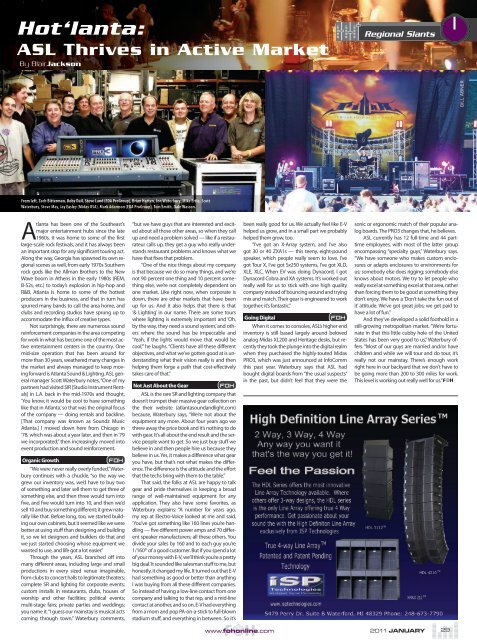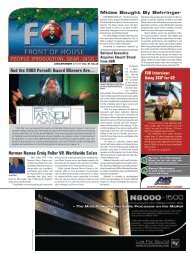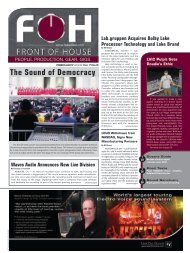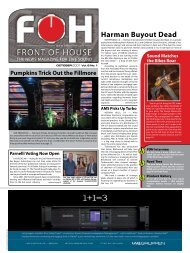Download a pdf - FOH Online
Download a pdf - FOH Online
Download a pdf - FOH Online
Create successful ePaper yourself
Turn your PDF publications into a flip-book with our unique Google optimized e-Paper software.
Hot‘lanta:<br />
ASL Thrives in Active Market<br />
By BlairJackson<br />
From left, Zach Bitterman, Roby Dail, Steve Land (EDA ProGroup), Brian Hatten, Jon Waterbury, Mike Ertle, Scott<br />
Waterbury, Steve May, Jay Easley (Midas USA), Mark Adamson (EDA ProGroup), Tom Smith, Dale Wasson.<br />
Atlanta has been one of the Southeast’s<br />
major entertainment hubs since the late<br />
1960s. It was home to some of the first<br />
large-scale rock festivals, and it has always been<br />
an important stop for any significant touring act.<br />
Along the way, Georgia has spawned its own regional<br />
scenes as well, from early 1970s Southern<br />
rock gods like the Allman Brothers to the New<br />
Wave boom in Athens in the early 1980s (REM,<br />
B-52s, etc.) to today’s explosion in hip-hop and<br />
R&B, Atlanta is home to some of the hottest<br />
producers in the business, and that in turn has<br />
spurred many bands to call the area home, and<br />
clubs and recording studios have sprung up to<br />
accommodate the influx of creative types.<br />
Not surprisingly, there are numerous sound<br />
reinforcement companies in the area competing<br />
for work in what has become one of the most active<br />
entertainment centers in the country. One<br />
mid-size operation that has been around for<br />
more than 30 years, weathered many changes in<br />
the market and always managed to keep moving<br />
forward is Atlanta Sound & Lighting. ASL general<br />
manager Scott Waterbury notes, “One of my<br />
partners had visited SIR [Studio Instrument Rentals]<br />
in L.A. back in the mid-1970s and thought,<br />
‘You know, it would be cool to have something<br />
like that in Atlanta,’ so that was the original focus<br />
of the company — doing rentals and backline.<br />
[That company was known as Soundz Music<br />
Atlanta.] I moved down here from Chicago in<br />
‘78, which was about a year later, and then in ‘79<br />
we incorporated,” then increasingly moved into<br />
event production and sound reinforcement.<br />
Organic Growth <strong>FOH</strong><br />
“We were never really overly funded,” Waterbury<br />
continues with a chuckle, “so the way we<br />
grew our inventory was, we’d have to buy two<br />
of something and later sell them to get three of<br />
something else, and then three would turn into<br />
five, and five would turn into 10, and then we’d<br />
sell 10 and buy something different; it grew naturally<br />
like that. Before long, too, we started building<br />
our own cabinets, but it seemed like we were<br />
better at using stuff than designing and building<br />
it, so we let designers and builders do that and<br />
we just started choosing whose equipment we<br />
wanted to use, and life got a lot easier.”<br />
Through the years, ASL branched off into<br />
many different areas, including large and small<br />
productions in every sized venue imaginable,<br />
from clubs to concert halls to legitimate theaters;<br />
complete SR and lighting for corporate events;<br />
custom installs in restaurants, clubs, houses of<br />
worship and other facilities; political events;<br />
multi-stage fairs; private parties and weddings;<br />
you name it. “I guess our mainstay is musical acts<br />
coming through town,” Waterbury comments,<br />
“but we have guys that are interested and excited<br />
about all those other areas, so when they call<br />
up and need a problem solved — like if a restaurateur<br />
calls up, they get a guy who really understands<br />
restaurant problems and knows what we<br />
have that fixes that problem.<br />
“One of the nice things about my company<br />
is that because we do so many things, and we’re<br />
not 90 percent one thing and 10 percent something<br />
else, we’re not completely dependent on<br />
one market. Like right now, when corporate is<br />
down, there are other markets that have been<br />
up for us. And it also helps that there is that<br />
‘& Lighting’ in our name. There are some tours<br />
where lighting is extremely important and ‘Oh,<br />
by the way, they need a sound system,’ and others<br />
where the sound has be impeccable and<br />
‘Yeah, if the lights would move that would be<br />
cool,’” he laughs. “Clients have all these different<br />
objectives, and what we’ve gotten good at is understanding<br />
what their vision really is and then<br />
helping them forge a path that cost-effectively<br />
takes care of that.”<br />
Not Just About the Gear <strong>FOH</strong><br />
ASL is the rare SR and lighting company that<br />
doesn’t trumpet their massive gear collection on<br />
the their website (atlantasoundandlight.com)<br />
because, Waterbury says, “We’re not about the<br />
equipment any more. About four years ago we<br />
threw away the price book and it’s nothing to do<br />
with gear. It’s all about the end result and the service<br />
people want to get. So we just buy stuff we<br />
believe in and then people hire us because they<br />
believe in us. Yes, it makes a difference what gear<br />
you have, but that’s not what makes the difference.<br />
The difference is the attitude and the effort<br />
that the techs bring with them to the table.”<br />
That said, the folks at ASL are happy to talk<br />
gear and pride themselves in keeping a broad<br />
range of well-maintained equipment for any<br />
application. They also have some favorites, as<br />
Waterbury explains: “A number for years ago,<br />
my rep at Electro-Voice looked at me and said,<br />
‘You’ve got something like 160 lines you’re handling<br />
— five different power amps and 70 different<br />
speaker manufacturers; all these others. You<br />
divide your sales by 160 and to each guy you’re<br />
1/160th of a good customer. But if you spend a lot<br />
of your money with E-V, we’ll think you’re a pretty<br />
big deal.’ It sounded like salesman stuff to me, but<br />
honestly, it changed my life. It turned out that E-V<br />
had something as good or better than anything<br />
I was buying from all these different companies.<br />
So instead of having a low-line contact from one<br />
company and talking to that rep, and a mid-line<br />
contact at another, and so on, E-V had everything<br />
from a mom and pop PA-on-a-stick to full-blown<br />
stadium stuff, and everything in between. So it’s<br />
www.fohonline.com<br />
been really good for us. We actually feel like E-V<br />
helped us grow, and in a small part we probably<br />
helped them grow, too.<br />
“I’ve got an X-Array system, and I’ve also<br />
got 30 or 40 ZXA1s — this teeny, eight-pound<br />
speaker, which people really seem to love. I’ve<br />
got Tour X, I’ve got Sx250 systems, I’ve got XLD,<br />
XLE, XLC. When EV was doing Dynacord, I got<br />
Dynacord Cobra and XA systems. It’s worked out<br />
really well for us to stick with one high quality<br />
company instead of bouncing around and trying<br />
mix and match. Their gear is engineered to work<br />
together; it’s fantastic.”<br />
Going Digital <strong>FOH</strong><br />
When it comes to consoles, ASL’s higher end<br />
inventory is still based largely around beloved<br />
analog Midas XL200 and Heritage desks, but recently<br />
they took the plunge into the digital realm<br />
when they purchased the highly-touted Midas<br />
PRO3, which was just announced at InfoComm<br />
this past year. Waterbury says that ASL had<br />
bought digital boards from “the usual suspects”<br />
in the past, but didn’t feel that they were the<br />
Regional Slants<br />
sonic or ergonomic match of their popular analog<br />
boards. The PRO3 changes that, he believes.<br />
ASL currently has 12 full-time and 44 parttime<br />
employees, with most of the latter group<br />
encompassing “specialty guys,” Waterbury says.<br />
“We have someone who makes custom enclosures<br />
or adapts enclosures to environments for<br />
us; somebody else does rigging; somebody else<br />
knows about motors. We try to let people who<br />
really excel at something excel at that area, rather<br />
than forcing them to be good at something they<br />
don’t enjoy. We have a ‘Don’t take the fun out of<br />
it’ attitude. We’ve got great jobs; we get paid to<br />
have a lot of fun.”<br />
And they’ve developed a solid foothold in a<br />
still-growing metropolitan market. “We’re fortunate<br />
in that this little cubby hole of the United<br />
States has been very good to us,” Waterbury offers.<br />
“Most of our guys are married and/or have<br />
children and while we will tour and do tour, it’s<br />
really not our mainstay. There’s enough work<br />
right here in our backyard that we don’t have to<br />
be going more than 200 to 300 miles for work.<br />
This level is working out really well for us.”<br />
2011 JANUARY<br />
29<br />
bill abner
















